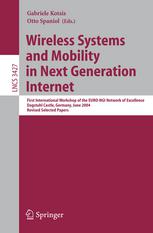

Most ebook files are in PDF format, so you can easily read them using various software such as Foxit Reader or directly on the Google Chrome browser.
Some ebook files are released by publishers in other formats such as .awz, .mobi, .epub, .fb2, etc. You may need to install specific software to read these formats on mobile/PC, such as Calibre.
Please read the tutorial at this link: https://ebookbell.com/faq
We offer FREE conversion to the popular formats you request; however, this may take some time. Therefore, right after payment, please email us, and we will try to provide the service as quickly as possible.
For some exceptional file formats or broken links (if any), please refrain from opening any disputes. Instead, email us first, and we will try to assist within a maximum of 6 hours.
EbookBell Team

0.0
0 reviewsThe Internet is subject to permanent modi?cations and to continuous restr- turing. This is primarily due to the tremendous rise in demand for bandwidth by the ever increasing number of users. When compared to the early years of the Internet the quality of the services o?ered had to be signi?cantly improved in di?erent respects (delay, network and service availability, jitter,. . . )inorder to satisfy the needs of many new applications. Within the last decade two new developments have contributed to many new opportunities, as well as to a need for intensive research and development: – the increased mobility of users together with the desire for ubiquitous hi- quality access to all o?ered services, at reasonable cost; – the use of wireless communication. Despite their relatively low capacity (when compared with ?xed backbone n- works) the use of radio links supports the ubiquitous availability of Internet services in a quasiperfect way. A considerable amount of research and development activities are currently - ing on worldwide in order to adapt Internet services to the particular needs of mobile users and of wireless communication links. These questions were - tensively discussed at the ?rst workshop organized by the EURO-NGI Network of Excellence (‘Next Generation Internet’), which has been funded by the - ropean Union since January 2004 under their IST programme.